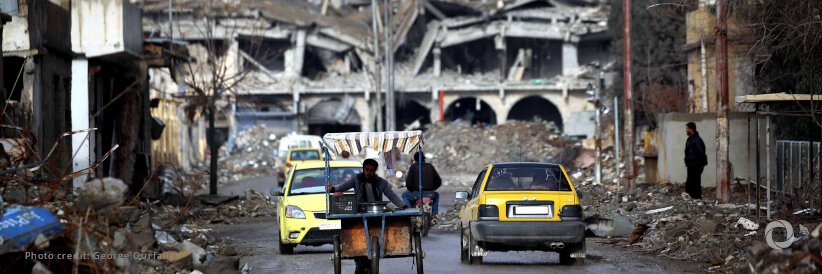Large-scale destruction and an absence of essential services are the top barriers for displaced Syrians wishing to return home, according to a survey by the Norwegian Refugee Council (NRC).
The organization surveyed 4,106 displaced people in northwest Syria about their plans and spoke to hundreds of families who have returned years after fleeing home.
In displacement camps in the northwest, only 8 per cent of people surveyed said they planned to return to their areas of origin within the next three months. Large-scale destruction and lack of savings, basic services, and jobs were all reported as blockers to return.
The northwest is one of the most densely populated regions in Syria, hosting around 3.4 million displaced people, the majority of whom are in makeshift camps.
“Syrians we spoke to told us they longed for their homes,” said Kathryn Achilles, NRC’s Head of Advocacy for the Middle East and North Africa, who visited the country earlier this month.
“However, that desire to be back is met with the chilling reality in Syrian towns and villages. People who go back to check on their homes are confronted with scenes of flattened buildings, wiped-out neighborhoods, pitch-black homes, and minimal job prospects. Many of them have lived in displacement camps in dire conditions for years but prefer to stay there for the time being. While it remains the case that hundreds of villages and towns are not prepared for a mass return of people, Syrians who wish to return must be supported. Most importantly, they must be able to access accurate information on conditions in their areas of origin and receive support in making informed decisions about returning.”
In Homs City, NRC spoke to families who had returned after years of displacement. The majority of them reported being pushed to return from Lebanon. Others said they planned to go back to Idlib after realizing there were no sustainable services and experiencing high prices in local markets in areas of return. Power shortages are widespread, with some areas receiving as little as 45 minutes of electricity every eight hours, affecting heating and business productivity.
Housing in major provinces including Aleppo, Homs, and Rural Damascus remains one of the biggest challenges for returnees. Many families require home repairs to be able to stay. Nine in 10 people surveyed said their homes were either destroyed or uninhabitable.
In other cases observed by NRC, families arrived at their homes only to find their homes were occupied by other families, meaning that these families often have to leave and find alternative accommodation. As more people start to return, rents are likely to rise, ultimately creating a risk of new displacement amid high unemployment and economic crises.
Saer, 35, has returned to his damaged house in Homs, central Syria, after a decade he spent with his family in Turkey. He told NRC, “We are back to our home, neighbors and land, but it is heartbreaking to see the house in this state. It will need 30-40 million Syrian pounds, or around $3,000 US dollars to repair. It will take a lot of time to get money, especially without any income. We need job opportunities. I have worked as a builder. I brought my toolkit thinking there would be jobs available, but there is nothing so far.”
NRC supports both displaced and returnee communities with legal assistance, shelter, education, and cash, mainly used for heating, food, and medication. The organization is also establishing help desks on the Syrian side of the border with Lebanon to provide legal advice for people crossing back into the country.
NRC urges the international community to ensure that support in this critical juncture of the response is forward-looking and moves beyond lifesaving assistance across Syria. Planned programs must include longer-term support that includes repairing homes, schools, and hospitals alongside enabling access to the basics such as electricity, clean water, and food. This also hinges on legal supports that allow people to access identity documents and ensure people can claim their housing, land, or property rights – which are a critical part of rebuilding.
While there is new hope for Syrians, conflating a change in context with total safety could put communities at risk of prematurely returning to areas where homes are demolished, services are non-existent, jobs are nowhere to be found and debris from conflict has not yet been safely cleared.
“We have a window of opportunity to ensure sustainable assistance is provided now in ways that allow for the eventual return home. International donors should step up their support to enable Syrians to get back on their feet and rebuild their lives after years of conflict and displacement,” said Achilles.

